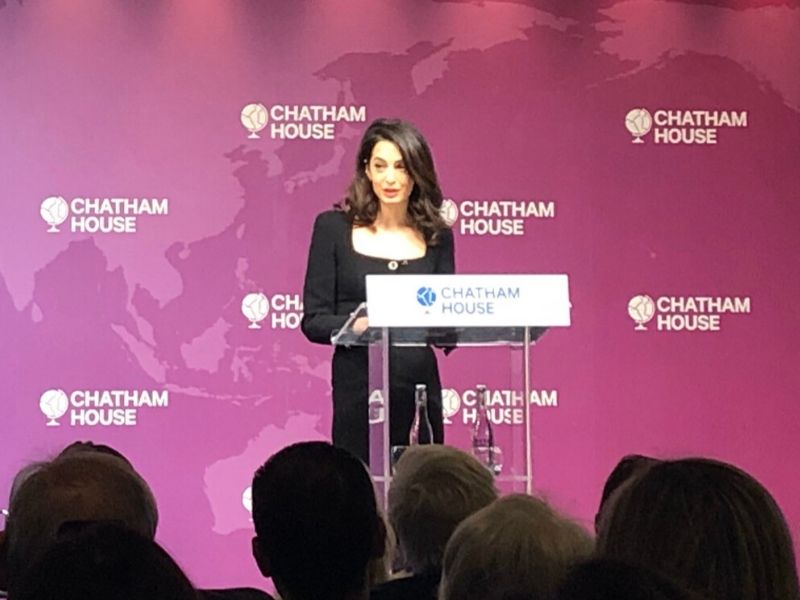Officials and prosecutors who arbitrarily detain journalists or impose blanket restrictions on free expression should be subject to a new regime of targeted international sanctions, according to a groundbreaking report by an international panel on media freedom chaired by human rights lawyer Amal Clooney.
“Targeted sanctions are among the most effective tools in a government’s arsenal to enforce human rights obligations, including the obligation to respect free speech and protect the media,” Clooney said in a discussion panel on Tuesday.
These sanctions, that should include freezing the individual’s assets or withholding travel visas, could be imposed unilaterally by governments, or by a group of States, according to the report.
The unjust imprisonment of journalists would meet the threshold for sanctions and the penalties could be imposed not just on the officials charging the journalist, but also prosecutors and judges deemed to be complicit in the sentencing.
The report was drawn up by Clooney, together with a high-level panel of legal Experts on Media Freedom, which is an independent body convened at the request of the UK and Canadian governments and is made up of 15 lawyers, academics and experts.
“It is the hope of the panel that governments will look to the recommendations in this report to curb human rights abuses and do more to protect journalists around the world,” Clooney said.
The Committee for the Protection of journalists said it endorsed the report and called for governments to take action: “We chose to engage, given the current vacuum of leadership on press freedom globally. As the US pulls back from its historic support, we need other countries to step up – including the UK and Canada, which in July published a global pledge on media freedom”.
It was also welcomed by Bill Browder, Head of Global Magnitsky Justice campaign, welcomed “Clooney’s call for Magnitsky sanctions to be applied to dictators and kleptocrats who torture and kill journalists”.
Amal Clooney calls for Magnitsky sanctions to be applied to dictators and kleptocrats who torture and kill journalists in new report prepared in conjunction with the International Bar Association. https://t.co/dbY96eA9x2
— Bill Browder (@Billbrowder) February 13, 2020
The report calls on signatories of the media freedom pledge to introduce and amend what has become known as ‘Magnitsky’ laws, which are named after Russian lawyer Sergei Magnitsky, who died in prison in 2009 after exposing official corruption.
It looked into the limited number of countries where Magnitsky laws have been adopted or are under consideration and recommends their expansion to respond to a wider array of abuses against journalists and “systemic restrictions on the media,” including abduction, physical violence, arbitrary detention, and wide-scale censorship, including of internet.
Magnitsky had alleged that various government officials were complicit in corruption that defrauded the Russian State of some $230 million in tax revenue. Russian authorities then arrested and imprisoned him. He died 12 months later.
His case has cast an international spotlight on the Russian government’s handling of whistleblowers, critics and political opponents. Magnitsky’s plight led to international outrage over the erosion of the rule of law in Russia, resulting in the creation of ‘Magnitsky Acts’ in the US, the UK, Canada, Latvia, Estonia and Lithuania. The law authorises governments to sanction specific individuals identified as human rights abusers.
The ECHR ruled, in a case presided by former Maltese European Court of Human RIghts Judge Vincent DeGaetano, that Moscow must pay Magnitsky’s mother and widow $38,000 (€34,000) in damages for violating his human rights, including inhuman and degrading detention conditions, unjustified extensions of his detention, and the posthumous trial and conviction.













